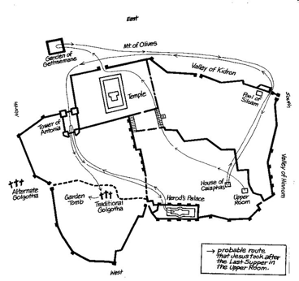WALK WITH ME!
Week Twelve (Mar 19-26)
Matt 26:47-27:44; Mark 14:43-15:32; Luke 22:47-23:43; John 18:2-19:27
Christ before Sanhedrin (Matt 26)
This week we move on from Jesus’ arrest in the Garden of Gethsemane, to his trial before before the Jewish Sanhedrin. And as we’ve seen thus far, much of this account is found in all four of the Gospels to one extent or another. Matthew’s account here is almost verbatim of Mark’s. While John includes certain parts of the story that Mark and Matthew do not, and Luke’s Gospel is the briefest of all of them with regards to Jesus’ appearance before the Jewish council. And, as usual, when you put all of these accounts together you’re often given a fuller picture of the events.
It’s here in Matthew 26 that we get an overview of what transpired next. Caiaphas questioned Jesus, and many false witnesses were brought out against him. And eventually after a sharp exchange between Jesus and Caiaphas (which we’ll look at here in a minute) they concluded that Jesus deserved death. And we’re told that many spit in his face, slapping him, striking him, and mocking him. Then at the beginning of chapter 27 we’re told that when morning had come, all the chief priests and the elders of the people took counsel against Jesus to put him to death. The trial that had begun under the cover of darkness had continued until morning when they made their official verdict. However, because the Jews were not permitted to carry out this death sentence themselves, they were forced to send him to their Roman Governor, Pontius Pilate.
Christ before Pilate – twice! (Luke 23)
The Jews state basically three charges against Jesus:
-Sedition,
-Not paying and teaching others not to pay the annual tribute tax,
-Assuming the title, King.
All of these charges they thought would be something the civil authorities would care about.
Their initial charge was that this man is trying to bring down our nation. He is teaching the people contrary to Roman rule. This is not a complete lie. Jesus was teaching about another kingdom. From the very beginning of His ministry He preached the Kingdom of God. He did not teach on how to be a good Roman citizen but how to be a good citizen in God’s Kingdom. From the point of view of the secular world, Jesus was misleading the nation. He taught a different and more significant purpose for living than simply being a Roman citizen.
Then they told Pilate that Jesus was claiming to be a King. This is partially true. He did claim to be a King and He was, but not in the sense that He was a King who was a political threat.
So they declared that:
-Jesus was teaching the people to rebel against Rome.
-He was teaching them not to fund Rome, and
-He was declaring Himself to be in authority as King over Rome.
I want us to get the full picture of Jesus before Pilate.
John 18:28 Then they led Jesus from the house of Caiaphas to the governor’s headquarters. It was early morning. They themselves did not enter the governor’s headquarters, so that they would not be defiled, but could eat the Passover.
Notice that these Jewish leaders would not enter into Pilate’s house because they believed this would defile them so that they could not celebrate the Passover. Never mind that they were liars and murderers and already defiled. As though the lies and false accusations were not enough!
Christ before Herod (Luke 23)
Only in Luke - Jesus was taken to the cruel king Herod. Herod was the same king who had John the Baptist beheaded over his preaching. Later, he would be the king who would have James, the half brother of Jesus put to death. He was cruel through and through. Herod was also in Jerusalem for the Passover. Pilate, who was a good politician, saw his opportunity to ignore Jesus.
Herod was a wicked Jewish King. If anyone would have a problem with these claims of Jesus it would have been Herod. Antipas, was a 1st-century ruler of Galilee who bore the title of tetrarch (“ruler of a quarter”). Herod was the ruler over the area where most of Jesus’ public ministry had taken place, yet it seems, he had never before seen Jesus.
Alone stood our Lord, beaten and bloody. The Jews were shouting His crimes over and over in Herod’s presence. Surely, the Jews must have thought they would get somewhere with Herod. Because Jesus would not answer or do any signs Herod and his soldiers joined in to beat and mock Jesus more. They dressed Jesus in kingly clothes in order to make fun of Him and then sent Him back to Pilate.
What’s important is that even the wicked and perverse King Herod did not find Jesus guilty of any crime, nevertheless a crime that deserved death. So rather than Jesus entertaining him with a magic trick, Herod was entertained as they mocked Jesus. He sends Him back where He came from, back to Pilate.
I am including the map of this final night of the arrest and trials for you to review.



